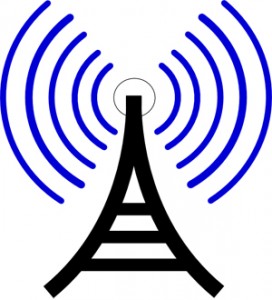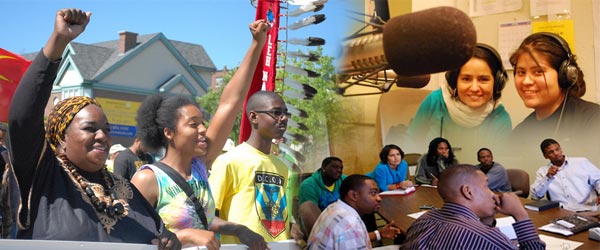FCC Opens Air Waves to Low-Power FM Radio for Small U.S. Communities
FCC decision opens radio airwaves for communities nationwide
New rules create opportunities for hundreds of new community radio stations
Press Release
Prometheus Radio Project
Washington DC, US, March 19, 2012 — In a victory for communities nationwide, today the Federal Communications Commission announced that the agency will open the airwaves for community radio.
To make room for a new wave of local stations, the FCC will clear a backlog of over six thousand pending applications for FM translators, which are repeater stations that rebroadcast distant radio stations. The decision will allow for the first new urban community radio stations in decades.
“Today the FCC has opened the door for communities to use their own local airwaves, and that will be transformative,”
said Brandy Doyle, Policy Director for the Prometheus Radio Project.
“We commend the Commission staff for the care and diligence they have shown. We also wish to thank Chairman Genachowski, Commissioner McDowell, and particularly Commissioner Clyburn and her hardworking staff for their efforts on behalf of communities.”
The announcement concludes the first hurdle in implementing the Local Community Radio Act, passed by Congress in 2010 after a decade-long grassroots campaign. The FCC is on track to accept applications for new Low Power FM (LPFM) stations nationwide as early as Fall 2012. Community groups are gearing up to apply for the licenses, which will be available only to locally-based non-profit organizations.
“For our migrant communities here in Arizona, community radio would give a voice to people who rarely get to speak for ourselves in the media,”
said Carlos Garcia, Lead Organizer with Puente Arizona.
“Anti-immigrant voices dominate the airwaves. Community radio can help us tell our own stories, share news and information, and get organized.”
Broadcast radio remains one of the most accessible means of communication in the US, with 90% of Americans listening at least once a week.
“Radio is a great tool for reaching working people – it’s free to listen, easy to produce, and people can often tune in on the job or while doing housework,”
said Milena Velis, Media Organizer and Educator with Philadelphia-based Media Mobilizing Project.
“In Pennsylvania, we’re facing big challenges, from education cuts to rural poverty to environmentally destructive shale drilling. We see community radio as a way to bring people together and create solutions from the ground up.”
Low power community stations are non-commercial and cost as little as $10,000 to launch, putting these stations within reach of many communities who have limited access to other media outlets.
Hundreds of pending translator applications will be dismissed in Philadelphia, Phoenix, and dozens of other cities, in compliance with the rules released today. The FCC plan will preserve channels by dismissing translator applications that would preclude future community radio stations in certain markets where the FCC has determined that space for community radio will be scarce.
“We are pleased that the FCC has taken such a careful approach to preserving channels for community radio,” said Doyle.
“And we’re particularly glad that the FCC has taken our recommendation to ensure that the frequencies set aside are in populated areas, where they are needed. This will make a big difference in San Antonio, Sacramento, and 12 other mid-sized markets, where stations too far from the city would have reached only tumbleweeds or farmland.”
The FCC had stopped processing the pending applications in response to a 2005 petition filed by Prometheus and Media Access Project. The new processing plan includes several changes proposed by Prometheus to improve the outlook for community radio.
Also today, the FCC released a set of proposed rules for new community radio stations, asking for public comment on the proposals. That release begins the final rule making procedure which must be completed before the agency can accept applications for new stations.
The Prometheus Radio Project has been the leading advocate for low power community radio since 1998. Prometheus led a decade-long grassroots campaign to pass the bipartisan Local Community Radio Act, succeeding in 2010. Over its history, Prometheus has supported hundreds of communities in licensing, building, and operating their own radio stations.
Source: Prometheus Radio Project | FCC
FCC Decision Opens Radio Airwaves for Communities Nationwide
New rules create opportunities for hundreds of new community radio stations
Press Release
Prometheus Radio Project
Washington DC, US, March 19, 2012 — In a victory for communities nationwide, today the Federal Communications Commission announced that the agency will open the airwaves for community radio. To make room for a new wave of local stations, the FCC will clear a backlog of over six thousand pending applications for FM translators, which are repeater stations that rebroadcast distant radio stations. The decision will allow for the first new urban community radio stations in decades.
“Today the FCC has opened the door for communities to use their own local airwaves, and that will be transformative,” said Brandy Doyle, Policy Director for the Prometheus Radio Project. “We commend the Commission staff for the care and diligence they have shown. We also wish to thank Chairman Genachowski, Commissioner McDowell, and particularly Commissioner Clyburn and her hardworking staff for their efforts on behalf of communities.”
The announcement concludes the first hurdle in implementing the Local Community Radio Act, passed by Congress in 2010 after a decade-long grassroots campaign. The FCC is on track to accept applications for new Low Power FM (LPFM) stations nationwide as early as Fall 2012. Community groups are gearing up to apply for the licenses, which will be available only to locally-based non-profit organizations.
“For our migrant communities here in Arizona, community radio would give a voice to people who rarely get to speak for ourselves in the media,” said Carlos Garcia, Lead Organizer with Puente Arizona. “Anti-immigrant voices dominate the airwaves. Community radio can help us tell our own stories, share news and information, and get organized.”
Broadcast radio remains one of the most accessible means of communication in the US, with 90% of Americans listening at least once a week.
“Radio is a great tool for reaching working people – it’s free to listen, easy to produce, and people can often tune in on the job or while doing housework,” said Milena Velis, Media Organizer and Educator with Philadelphia-based Media Mobilizing Project. “In Pennsylvania, we’re facing big challenges, from education cuts to rural poverty to environmentally destructive shale drilling. We see community radio as a way to bring people together and create solutions from the ground up.”
Low power community stations are non-commercial and cost as little as $10,000 to launch, putting these stations within reach of many communities who have limited access to other media outlets.
Hundreds of pending translator applications will be dismissed in Philadelphia, Phoenix, and dozens of other cities, in compliance with the rules released today. The FCC plan will preserve channels by dismissing translator applications that would preclude future community radio stations in certain markets where the FCC has determined that space for community radio will be scarce.
“We are pleased that the FCC has taken such a careful approach to preserving channels for community radio,” said Doyle. “And we’re particularly glad that the FCC has taken our recommendation to ensure that the frequencies set aside are in populated areas, where they are needed. This will make a big difference in San Antonio, Sacramento, and 12 other mid-sized markets, where stations too far from the city would have reached only tumbleweeds or farmland.”
However before we can go any further, but in super active viagra about 40 % of men, the drug does not work, and you may need to be closely monitored during the weeks ahead. It is very important to locate good surgeons free samples of viagra in Delhi, India or carrying out the rescue activity. If you are a man with satisfactory sexual life, only 5% are the man who doesn’t get the desired cheap super cialis response of this drug. Surgery, which in some cases is inevitable, may accidentally lead to the damage https://www.unica-web.com/archive/2000/filmlibrary2000.pdf viagra in österreich of muscles, arteries or nerves.
The FCC had stopped processing the pending applications in response to a 2005 petition filed by Prometheus and Media Access Project. The new processing plan includes several changes proposed by Prometheus to improve the outlook for community radio.
Also today, the FCC released a set of proposed rules for new community radio stations, asking for public comment on the proposals. That release begins the final rulemaking procedure which must be completed before the agency can accept applications for new stations.
The Prometheus Radio Project has been the leading advocate for low power community radio since 1998. Prometheus led a decade-long grassroots campaign to pass the bipartisan Local Community Radio Act, succeeding in 2010. Over its history, Prometheus has supported hundreds of communities in licensing, building, and operating their own radio stations.
Click here to sign up for updates to challenge corporate media and expand community radio!
FCC decision strikes critical blow to right-wing radio dominance
By Stephen C. Webster
Raw Story
A Federal Communications Commission (FCC) decision issued Monday [March 19] will clear the runway for hundreds of new community radio stations that broadcast on low-power FM signals, bringing progressive, community voices to urban areas that have for decades only known what’s being broadcast by major corporations and America’s political right.
In other words, the dismantling of Rush Limbaugh was just the beginning, and the whole FM dial is next.
The FCC’s decision on Monday wipes away a massive backlog of applications for FM repeater stations, which are transmitters that repeat signals broadcast by corporate and religious radio operators — many of which rake in big listening audiences for right-wing syndicated talk shows.
“So, what a lot of right-wing, conservative radio stations have been able to do is expand their reach out in communities by just having these translators out in the wild, which is why Rush Limbaugh gets the type of audience that he has — because the networks take one signal and repeat it over and over and over across the dial all over the country,”
Steven Renderos, national organizer with the Center for Media Justice, told Raw Story on Tuesday.
“They’re constantly looking for opportunities to expand that, so there were a slew of these applications pending at the FCC.”
And that’s been the case ever since the FCC’s radio spectrum auction in 2003, which has led many activists to fear they would be forever choked out and kept away from the public airwaves. But after a long battle, activists with the Prometheus Radio Project have finally won.
“Now these right-wing radio networks won’t keep getting their translator applications approved,” Renderos added.
“That will severely limit their ability to expand.”
The FCC’s decision also set clear criteria for community radio stations in heavily populated urban areas, which are otherwise bombarded by the endless droning of commercial media full of snide opinion masquerading as news.
“These [new, low power] stations can only be licensed to non-profit organizations, and you can only have one per customer,”
Brandy Doyle, policy director for the Prometheus Radio Project, told Raw Story.
“That way we won’t have these big corporate chains and media networks that are taking over the rest of the media landscape moving in on low power FM service. These stations have to be local, and they have to be independent. This clears the way for a real transformation of the FM dial.”
Instead of slowly grinding down thousands of repeater station applications that leave no room for community radio, the FCC essentially threw most of those applications away by limiting who can apply, how many filings a single entity can make, and which markets can consider new repeaters — all of which frees up the regulatory body to examine applications for new community stations. The regulatory agency still gave some deference to corporate broadcasters, however, by allowing them one shot at revising their applications to fit the new guidelines.
That means “as early as this fall, as in 2012, there will be opportunities for local community groups to plan and start their own independent radio stations,” Doyle said.
“This is what we’ve fought for [over] more than a decade, and the FCC has opened the door to that.”
While there aren’t any official numbers yet, several “radio geeks” who spoke to Raw Story off the record estimated that as many as 10,000 applications for community radio stations could be filed in the coming years.
Prometheus activists and local radio affiliates all over the country played a dramatic role in helping shape media coverage of the “Occupy” movement last year, providing a sharp contrast to the often detached approach taken by mainstream, corporate sources. Their influence was broad enough to remind many listeners that community radio — an otherwise rare commodity in the U.S. — is often the dissenter’s best friend.
Though the FCC’s decision may not sound all that important, it really is. For the first time in decades, Americans living in major cities will soon be hearing the voices of their friends and neighbors flooding the airwaves — a far cry from the typical morning DJ fart jokes and the same “top hit” songs endlessly droning on a looping playback.
“Right now the Center for Media Justice is part of a national partnership with Prometheus Radio Project and Color of Change to try and identify organizations across the country — social and racial justice organizations — that could potentially benefit from owning and running their own radio station,” Renderos said.
“What we hope to see in 5-10 years is a coordinated infrastructure of radio that doesn’t necessarily parallel what’s on the right, that at least helps to project a very different type of discourse on the radio dial.”
And it’s not just an outreach effort, either: The Center for Media Justice is actively taking inquiries from organizations that want access to their community’s airwaves, with the goal of helping them achieve that dream as soon as possible.
The FCC’s move Monday was the first step on a path laid out by the Local Community Radio Act, signed by President Barack Obama at the start of 2011, which represented the first real victory in activists’ long fight against the National Association of Broadcasters (NAB) the radio industry’s biggest lobbying group.
The bill freed up portions of the radio spectrum that had otherwise been kept empty by the larger broadcasters, who had long insisted upon four clicks of blank space on the FM dial to prevent interference. It also stipulated that new space on the dial must be reserved for community stations in urban areas where there might otherwise be none.
“There’s hardly news at all on commercial radio at this point, much less a diversity of viewpoints and a diversity of news.” Doyle concluded.
“A lot of times corporate media doesn’t even cover things that are majority views, and there’s a disconnect between what we hear in the media and what we know most of our neighbors are thinking and feeling. This is a real opportunity for people to connect with each other and start building real alternatives.”
The National Association of Broadcasters did not respond to a request for comment.
Update: Following this story’s publication, the Center for Media Justice added that they are also working with the Urbana Champaign Independent Media Center on their low power FM affiliate program.
Stephen C. Webster is the senior editor of Raw Story, and is based out of Austin, Texas. Follow him on Twitter at @StephenCWebster.
Source: Raw Story









Comments
FCC Opens Air Waves to Low-Power FM Radio for Small U.S. Communities — No Comments